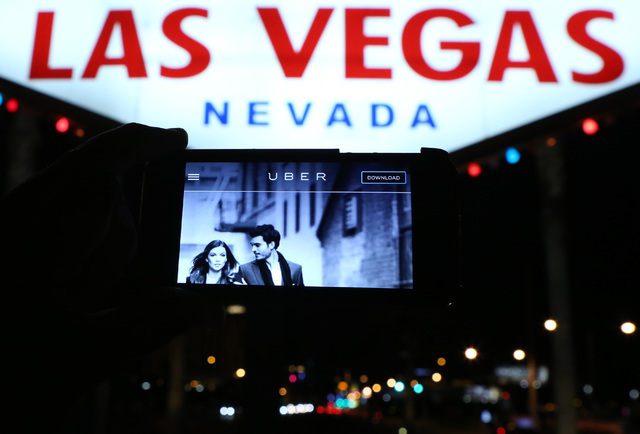EDITORIAL: Uber legislation imperfect, but must pass

In case Nevadans needed another reason why ride-sharing services such as Uber must be allowed to operate in the state, the Taxicab Authority Board provided one at its Tuesday meeting.
The taxicab industry, overregulated and inflexible by design, doesn’t always serve its customers well because it can’t adjust to the pressures of supply and demand on the fly. The Taxicab Authority, which exists primarily to protect existing companies from outside competition and each other, tightly controls the number of cabs that can operate on the streets. On Tuesday, the board decided to allow more cabs for the Electric Daisy Carnival, the electronic music festival that will attract hundreds of thousands of attendees to Las Vegas Motor Speedway from June 19-21.
Hotels and restaurants adjust staffing all the time based on visitor projections, reservations and special event schedules, but a state board must give cab companies permission to serve visitors who’ll need a ride from the Strip to the speedway and back. Imagine a baker needing a regulatory body’s approval to make more muffins because of anticipated demand, and that body taking into consideration the effect on other bakers before making a decision. It’s absurd.
Untold thousands of Electric Daisy Carnival attendees won’t look to the cab line for a lift. They’ll pull out their smartphones and tap the Uber app to hail a private car, just as they do at home or while traveling around the country. But the app won’t work because last year Nevada became the first state to shut down Uber. And those visitors will be completely justified in asking, “Could this place be more backward?”
It will take a new state law to allow Uber to operate here, and the Nevada Legislature, less than two weeks from adjournment, is running out of time to pass enabling legislation.
Using an app-based platform, Uber and similar transportation network companies connect drivers to passengers, generally in less time and for less money than taxis. Uber drivers, who use their own cars and work for themselves, have an incentive to be courteous, to maintain their vehicles and to drive safely: Passengers rate their service, which influences whether other riders are willing to use them. And drivers rate passengers, which gives riders an incentive to be ready for pickup, be polite and tip good service. Drivers and passengers who compile poor ratings can effectively shut themselves out of the service entirely.
Uber drivers, who must pass background checks and have their vehicles inspected, are free to work as much or as little as they want. They respond to demand and price accordingly — if a rider wants to pay less and wait for a cab that might not show up, he is free to do so. Uber collects a share of the fare, which is billed to the rider’s credit card through the app.
But instead of embracing the efficiencies of Uber’s business model and calling for deregulation, the taxicab industry wants Uber to conform to the outdated taxi regulations that inflate fares and contribute to slower, poorer service — especially in residential areas.
The state is pushing hard for economic development and diversification, especially in the high-tech sector, but its approach to the rapidly evolving transportation industry sends a signal that Nevada isn’t interested in change or competition. It’s profoundly embarrassing that Las Vegas, a global convention destination, is the largest metropolitan area in the United States that prohibits transportation network companies such as Uber.
Legislation to legalize Uber has traveled a perilous path in Carson City. The surviving incarnation exists as an amendment to Assembly Bill 175, which addresses seat belt usage in taxicabs. As with previous versions, the bill would subject transportation network companies to regulation through the Public Utilities Commission, setting the state’s own permit, insurance and background check standards. More significantly, AB175 imposes a 3 percent fare tax on all fares — including those provided by taxicabs.
The tax, which was added by Senate Majority Leader Michael Roberson, R-Henderson, to fully fund a planned UNLV medical school and boost highway funding, raises the bar for passage of AB175. Instead of requiring a simple majority vote, the new tax needs two-thirds support.
AB175 passed the Senate 18-1 and is back with the Assembly. Making Uber legal and subjecting its riders to a new tax should be two separate policy questions. Would lawmakers even consider taxing taxicab rides if the Uber bill weren’t before them? Probably not. Uber simply happened to provide senators with an opportunity to create more state spending money.
Other cities and states that have had safety or regulatory concerns about Uber have moved much more quickly to legalize the service. Keeping Uber out of Nevada for at least two more years — when the Legislature next convenes in regular session — would be unimaginable.
On Tuesday, the Taxicab Authority scheduled a special meeting for next week to discuss the board taking a position on Uber and lobbying the Legislature on the issue. Lawmakers shouldn’t wait that long. AB175 could be better — the PUC is ill-fitted to oversee Uber, and the Legislature has more than enough tax increases to consider — but if it’s the only way to move Nevada’s transportation system into the 21st century, lawmakers should pass it.